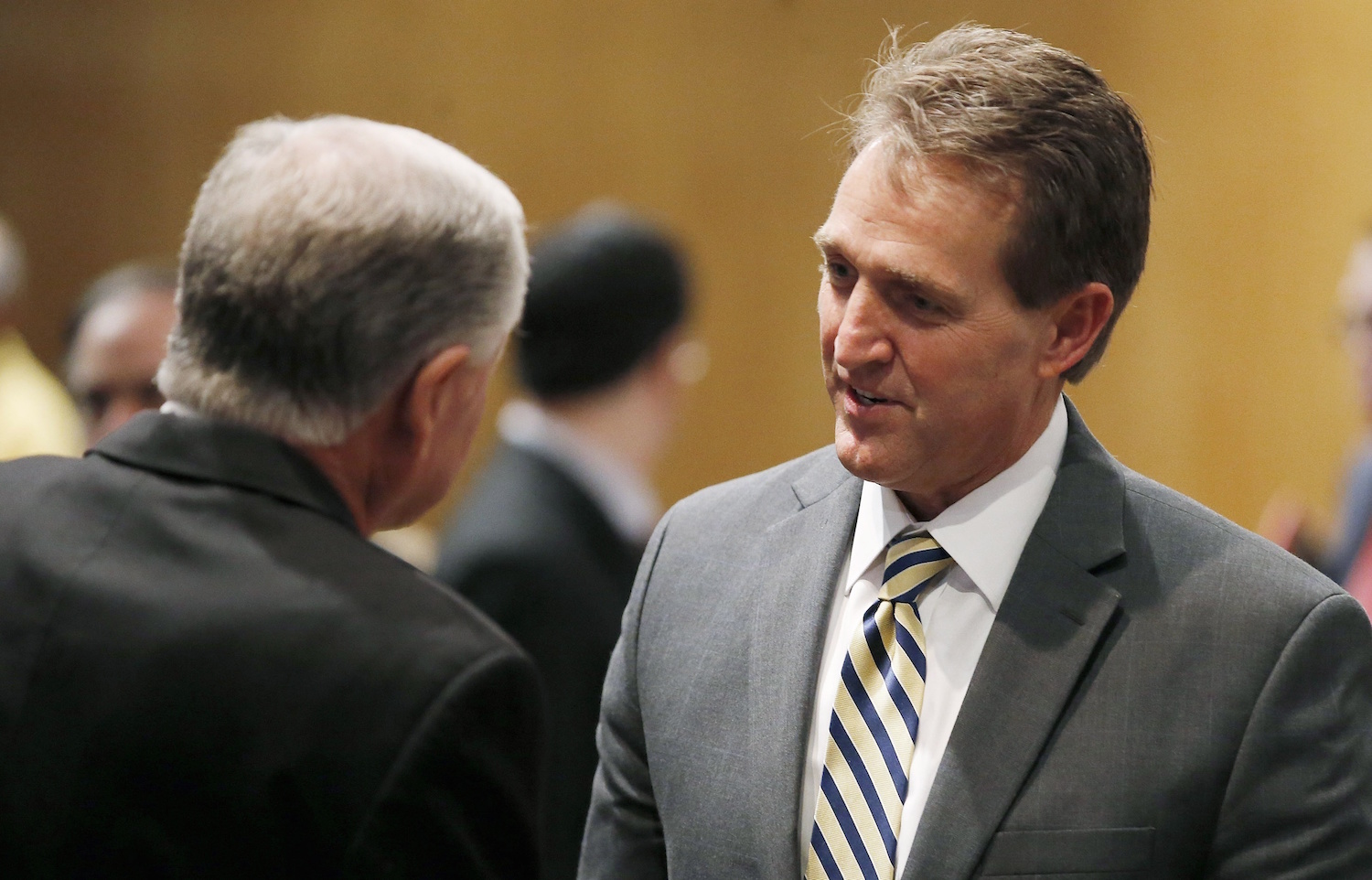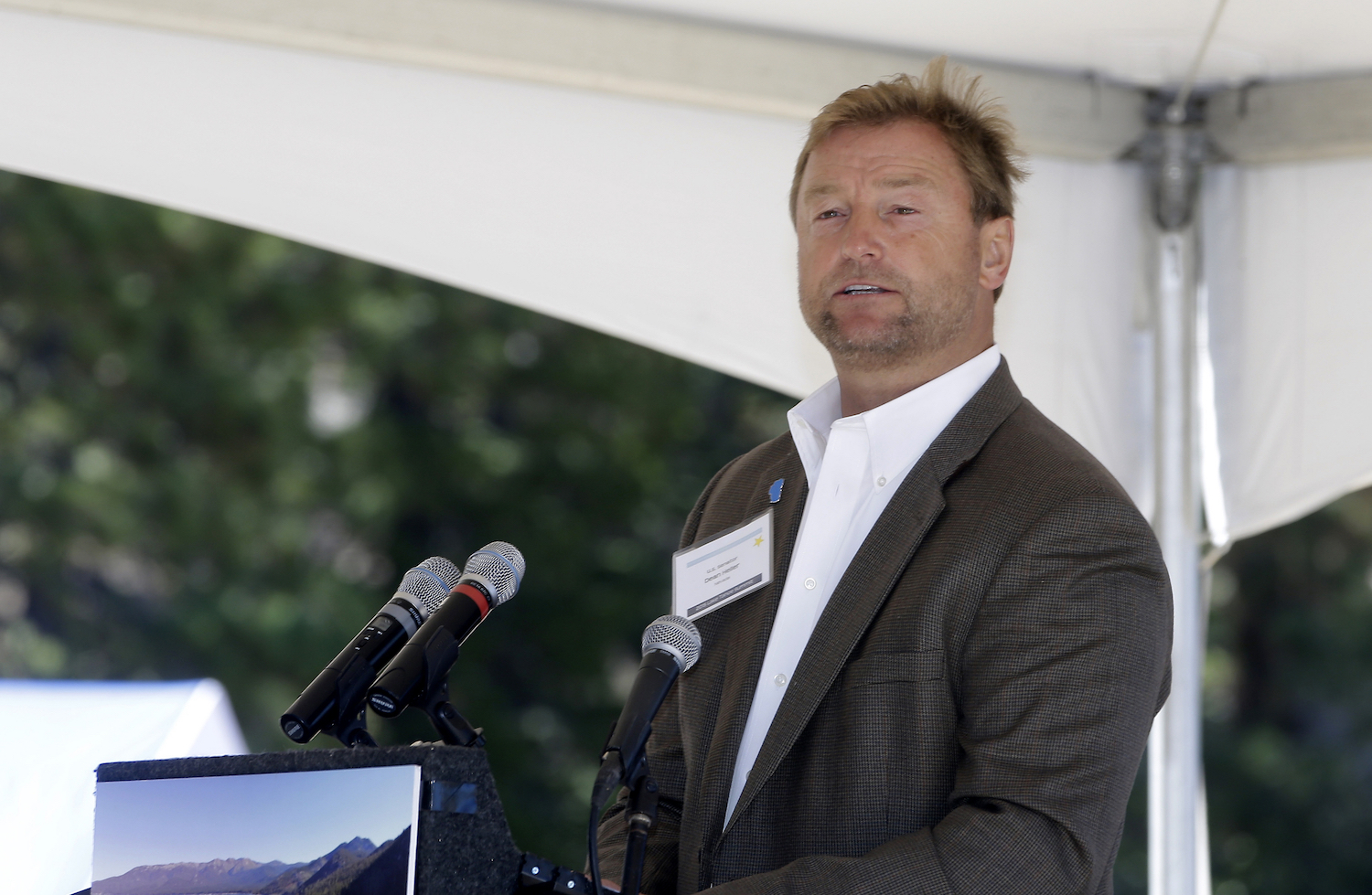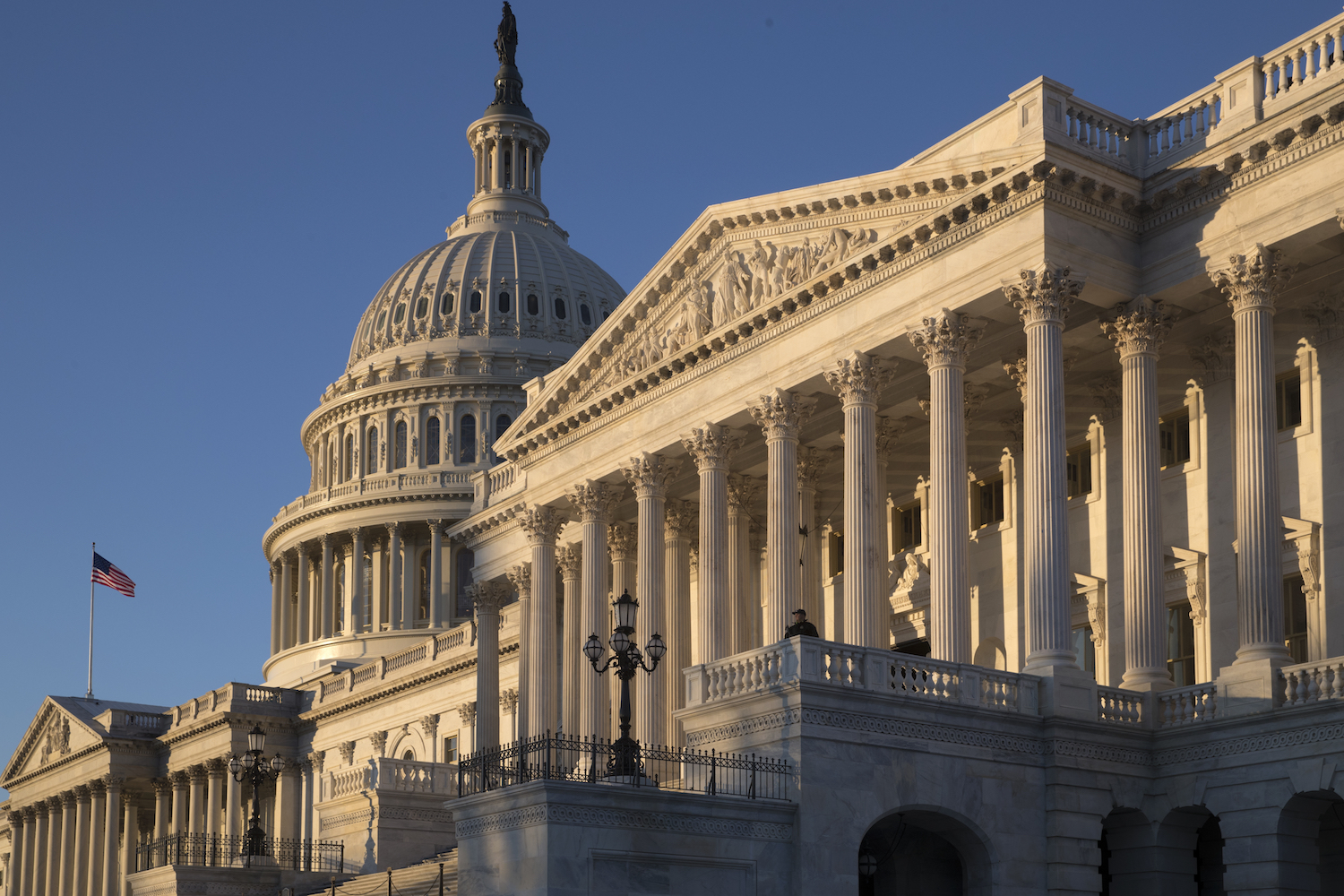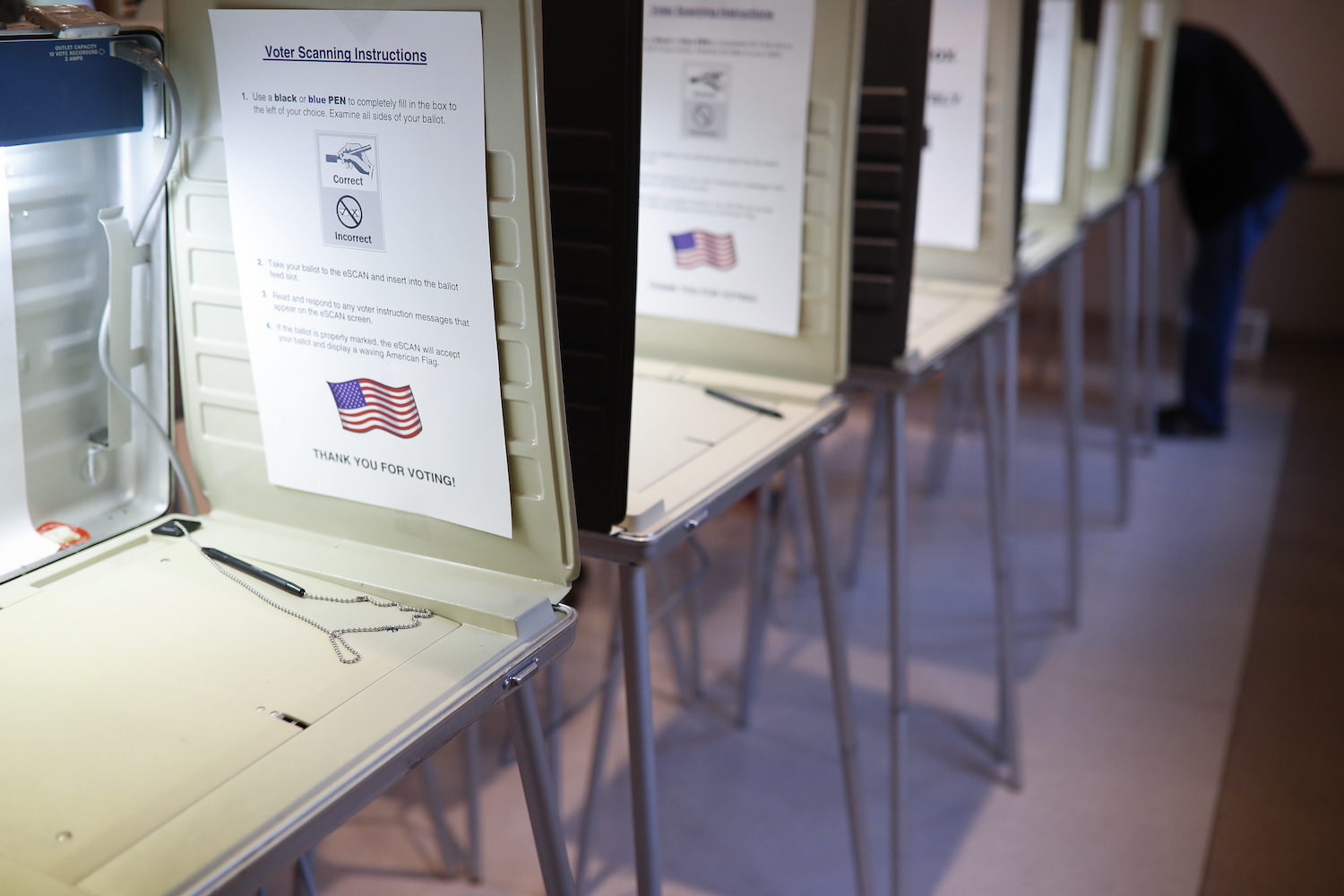Jeff Flake and Dean Heller are feeling the squeeze.
Both are Republican senators from out west who declined to support President Trump over Democrat Hillary Clinton. That is sure to test their relationship with Republican voters at home, possibly encouraging Trump loyalists bent on revenge to challenge them in their respective primaries.
Flake and Heller also are being stalked by the Left, thanks to the bleak map Senate Democrats see for themselves. Most seats up for election in 2018 feature Democrats trying to hang on in conservative territory. Flake in Arizona, and Heller in Nevada, running in states with diverse electorates and burgeoning Hispanic populations, offer the Democrats possibly their only hope of gaining ground.
In an interview, Flake acknowledged the pickle he might find himself in a year from now. The same goes for Heller.
A voting record largely in sync with the Trump administration should go a long way toward mending fences from 2016, diminishing the prospects of an annoying primary. At the same time, they’re relying on reputations for independence earned from crossing party lines to carry them through the general election.
It might not be that simple.

Both Flake and Heller are Republican senators from out west who declined to support President Trump over Democrat Hillary Clinton. That is sure to test their relationship with Republican voters at home. (AP Photo)
Foes of Flake and Heller on the Right and the Left — each for their own political reasons — are doing their best to keep the spotlight trained on the senators’ complicated relationship with the new Republican president.
Karl Frisch, executive director of the liberal group Allied Progress, explained why his group targeted Flake and Heller with television advertising aimed at pressuring them to reject the confirmation of Steven Mnuchin, Trump’s nominee to serve as treasury secretary.
“The two both had shown interest, or ability, to speak more independently about Donald Trump, and it was our hope that we might inspire some of that independence if they knew how horrible Mnuchin was for their states,” Frisch said.
Trump’s first midterm election is shaping up to be a promising year for Republicans. Only nine Republican-held Senate seats are up, and most are considered safely red. Of the Democratic-held seats on the ballot, 10 are in states where Trump defeated Clinton.
That is putting the squeeze on all sorts of incumbents. Democrats are running for re-election in states inclined to support Trump’s agenda, and there are Republicans besides Flake and Heller who opposed Trump, or were lukewarm toward his candidacy, who are still dealing with questions of just how loyal they are to their party’s president.
But Flake and Heller are unique among their colleagues in the pressure and potential vulnerability they’re facing from both ends of the political spectrum — and the bright red targets they have on their backs. Democrats and their allies are already taking shots at the two western senators, led by Allied Progress and its six-figure ad buy on Arizona and Nevada television.
This comes on the heels of Trump’s unusually weak performance in Arizona for a Republican presidential nominee. He defeated Clinton by only 4 percentage points, winning under 50 percent of the vote. Asked if he was concerned, Flake just shrugged.

Flake could be tested in Arizona by pro-Trump Republicans who are considering a 2018 bid, including state Treasurer Jeff DeWit and state Sen. Kelli Ward. (AP Photo)
“You just have to continue to say what you think and let the chips fall where they may,” Flake said in an interview with the Washington Examiner.
“I’ve always had primaries when I was in the House — I had primaries virtually every time, had a big primary in the Senate, had a big general in the Senate last time,” he added. “So, all you can do is continue to do what you’re doing. The worst thing would be to try to calculate or navigate based on politics. People sniff that out pretty fast.”
Flake could be tested. Pro-Trump Republicans, including state Treasurer Jeff DeWit and state Sen. Kelli Ward, who lost to Sen. John McCain in the 2016 primary, are considering a 2018 bid. DeWit was one of Trump’s biggest supporters during the campaign, and he could cause Flake heartburn if he runs and the senator fails to repair his relationship with GOP primary voters.
McCain, whose connection to Arizona conservatives has been contentious for years, rated more popular than Flake in a recent public opinion poll, according to Roll Call. Flake’s political team in Arizona is downplaying suggestions that he could be in particular trouble. So are Republicans in Washington.
Sen. Cory Gardner of Colorado, chairman of the NRSC, the Senate GOP campaign arm formerly known as the National Republican Senatorial Committee, rejected that either senator will feel any sort of pinch, arguing that the pair are doing what they need to do to win re-election.
“I think Sen. Flake and Sen. Heller do a great job at representing their states, and obviously, both of them put the interests of their states, Arizona and Nevada, first,” Gardner said in an interview. “The squeeze that some people may feel for them I don’t think will ever materialize.”
But neither is out of the woods.

Nevada Republicans are a fractious bunch, and that has led to some nasty primaries. Heller has to guard against that. (AP Photo)
Nevada Republicans are a fractious bunch, and that has led to some nasty primaries. Heller has to guard against that.
The Silver State also happens to be home to Trump’s most loyal Republican constituencies. When former Rep. Joe Heck, the GOP Senate nominee in 2016, disavowed Trump over news that he had joked about making unwanted sexual advances on women, it cost him at the ballot box.
Simultaneously, Nevada performed well for Democrats in that election, across the board. Hispanic voters flocked to the polls, and Clinton and down-ticket Democrats, including now-Sen. Catherine Cortez Masto, swept. That combination could pose problems for Heller next year. Clinton defeated Trump 48-45.5 percent.
Political advisers for Flake and Heller concede the existence of ammunition that can work against them.
Flake worked with former President Barack Obama on occasion and supported comprehensive immigration reform legislation that passed the Senate. And Flake didn’t just decline to endorse Trump. He was outspoken in his criticism of the celebrity businessman-turned-president. Heller has also been on record in favor of immigration reform, and worked with Democrats on legislation from time to time.
But on most litmus-test type issues — abortion, taxes, Obamacare, to name a few — Flake and Heller remain rock solid. That’s why their teams are confident that the senators will get through any primary challenge.
Flake was a leader in pushing Congress to ban earmarks, which are lawmakers’ pet spending projects, and has consistently voted to reduce spending. These are the issues that still matter the most to Republican primary voters in Arizona, Flake’s advisers say. Heller is similarly conservative, and over the next year expects to have a pro-Trump voting record on healthcare, taxes, judges and the president’s Cabinet picks.

On most litmus-test type issues — abortion, taxes, Obamacare, to name a few — Flake and Heller remain rock solid. (AP Photo)
In the general election, Flake and Heller are made strong by the very issues that are cause for concern in the primary. Heller has proven this strength once before, winning election in 2012 even as Obama was winning Nevada by 7 percentage points.
“Sen. Heller’s connection to Nevadans has always been personal,” said Las Vegas consultant Mike Slanker, Heller’s chief political advisor. “Those unique relationships are exactly how he outperformed the top of the ticket in 2012 by 7 points. He builds relationships by being here, by listening, by helping people — always has. And make no mistake, he will work harder than anyone. It’s who he is.”
In all of this, Trump is the wild card. If the president decides to get involved in the primary in support of a candidate, he could tip the scales. It’s something he’s shown an inclination to do.
Two weeks before inauguration, Trump meddled in a race for state GOP chairman in Ohio. In phone calls directly to members of the Ohio GOP state central committee who decided that contest, Trump convinced them to dump Matt Borges on the grounds that he wasn’t sufficiently loyal, and replace him with his favored candidate, Jane Timken.
Republican insiders warn that it would be a mistake to assume Trump won’t get involved in bigger contests of larger significance, say, a Senate primary. If the president weighs in, the candidate or incumbent he opposes could be in trouble.
“The new primary dynamic used to be like the Tea Party versus the Chamber [of Commerce]. Now I think it’s going to be Trump versus non-Trump,” said a GOP strategist, who spoke on condition of anonymity in order to speak candidly. “A lot is going to depend on how much he personally gets engaged.”

Flake in Arizona, and Heller in Nevada, running in states with diverse electorates and burgeoning Hispanic populations, offer the Democrats possibly their only hope of gaining ground. (AP Photo)
Gardner, of the NRSC, sidestepped when asked to comment on the possibility of Trump weighing in on the races.
He said Republicans shouldn’t have to worry about it, nor should Trump be motivated to interject himself, if congressional Republicans deliver on their promises.
“The president and members of the Senate … are working toward the interests of the people. This is going to be a pretty good couple of years,” Gardner said. “If the president governs the way he laid out to the American people … the day after the election about unity, about working toward more opportunities, about making sure we leave no one behind, then I think Jeff Flake and Dean Heller are going to be allowed to continue to serve their states.”
